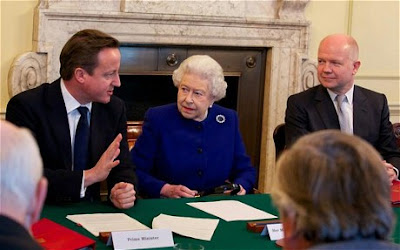The Queen in Cabinet
There's a good reason why the Queen has never attended a Cabinet meeting - or, indeed, that none of her predecessors has attended the Cabinet either, probably since a still-sane George III popped along in 1781. (A Downing Street press release yesterday, regurgitated by all news outlets, implied that Queen Victoria had done so, but there's no evidence that she ever did; in The Monarchy and the Constitution, Vernon Bogdanor states definitively that "since 1837 [the year of Victoria's accession] the sovereign has not attended cabinet at all".) The Cabinet, originally a committee of the wider Privy Council, is officially at least the primary political and policy-making organ of government. It is at the heart of the business of politics which a constitutional monarch is supposed to float above. Any monarch today who insisted on watching her or his ministers in action, as they discussed what to do about the issues of the day, would rightly be accused of interfering in politics and trying to subvert the constitution.
Queen Elizabeth II's visit to the Cabinet Office today, where she sat in on around half and hour of ministerial deliberations, was of course a purely formal occasion: she was there to receive the congratulations of her Privy Councillors on this summer's Diamond jubilee, along with a set of 60 placemats, and to hear an announcement that henceforth a stretch of Antarctic wilderness was to be named in her honour (which as a Christmas present, is rather less useful than an iPhone). Nevertheless, it was a proper cabinet meeting, with discussions that included the important topics of Afghanistan and the economy. It's unlikely that the discussions proceeded quite as they would have done had the monarch not been present. While she was there only as "an observer", she sat in the prime minister's chair, thus underlining the constitutional anomaly under which government in this country operates.
It is the Queen's government, not the people's. Too many government functions are still carried out by Royal Prerogative, with inadequate Parliamentary scrutiny. In the main, however, talk of "the Queen's ministers" is a polite fiction, and understood to be such. By inviting the queen along to a Cabinet meeting, David Cameron runs the risk of upsetting the balance. It is constitutionally improper for the Queen to be associated with a party-political instrument of government in this way, even if (perhaps especially if) she is understood by all to be no more than a cipher. This sets a bad precedent, even if the occasion itself is fairly anodyne. At best, it looks like an attempt to provide a helpful photo-opportunity for a bunch of politicians in desperate need of some good headlines, by associating them in the public mind with a monarch who's much more popular than they are. It may not be a monarch interfering in politics, but politicians interfering in the monarchy is the next worst thing. To preserve balance, the Queen should also be present at a meeting of the Shadow Cabinet - but that would, surely, be preposterous.
Now that this constitutional Rubicon (to use Cameron's own metaphor) has been crossed, it is more likely to happen again at some time. Perhaps next time it will be King Charles invited along on some celebratory pretext: could he be relied upon to sit politely and listen while others talk of great affairs? As it is, today's event has brought out the perennial forelock-tugging instincts of the British press. Timothy Stanley, for example:
How I would have dearly loved her to reach across the table, point at David Cameron and say, “You're fired!” But, alas, things have moved on since the days of Charles I, when the monarchy was the last line of defence against democracy.
There is, though, another interpretation. The Cabinet is not what it once was. Its meetings are largely formal affairs these days: the real decision-making happens elsewhere, in small sub-committees and informal one-to-one meetings between the prime minister and other members of the Cabinet. It's increasingly for show, too big to be really effective - its ranks swelled, indeed, by inviting along more junior ministers (such as Baroness Warsi) for no better reason than to flatter their fragile egos. The government is more collegiate than it was under Tony Blair, but if the Cabinet were genuinely effective it's unlikely that Cameron could have got through things like minimum unit pricing of alcohol, a policy which appears to be a personal obsession unpopular with most of his colleagues. It's been said that inviting the Queen to attend a Cabinet meeting is a compliment to her unimpeachable impartiality: she is so far above the political fray that it's "safe" to have her along to Downing Street without any fear of contaminating the quasi-republican process of democratic government. But perhaps the Cabinet itself that is now almost as decorative a part of the constitution as the monarch herself.
Queen Elizabeth Land sounds like a slightly tacky theme park where one can watch re-enactments of Francis Drake playing bowls or be served ale by wenches in mob-caps. It's not negligible, being about 170,000 square miles, and the gesture provides a nice reminder that even in these reduced days the British crown retains technical sovereignty over a number of desolate penguin colonies. But it scarcely compares with Virginia, named after the first Queen Liz, let alone all the mountains, cities, lakes, waterfalls, islands, provinces and states named after Victoria. She even has a crater on the surface of Mars. In retrospect, Victoria was a bit greedy when it came to having bits of the globe named after her, not leaving enough to her heirs and successors. And yes, she does have her own bit of Antarctica. It's called Victoria Land.

Comments